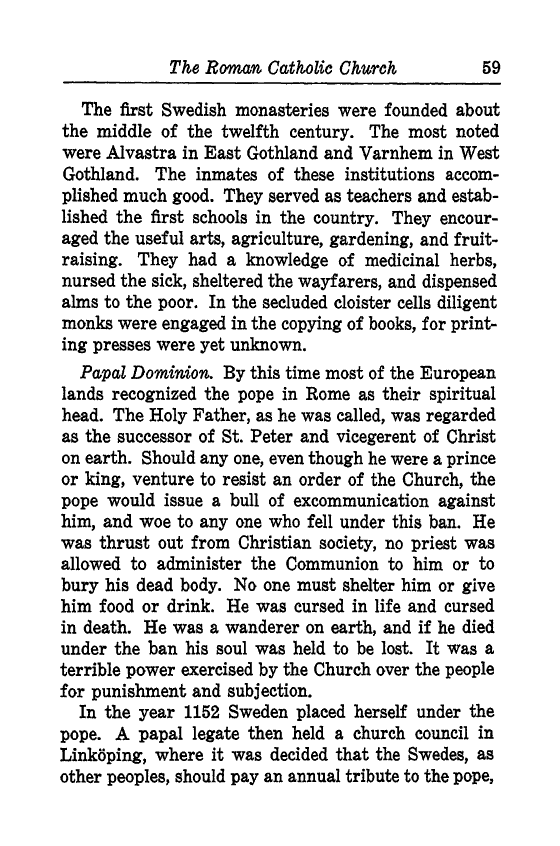
Full resolution (TIFF) - On this page / på denna sida - IV. The Early Catholic Period in Sweden - A. The Church, Its Cult and Customs

<< prev. page << föreg. sida << >> nästa sida >> next page >>
Below is the raw OCR text
from the above scanned image.
Do you see an error? Proofread the page now!
Här nedan syns maskintolkade texten från faksimilbilden ovan.
Ser du något fel? Korrekturläs sidan nu!
This page has never been proofread. / Denna sida har aldrig korrekturlästs.
The Roman Catholic Church 59
The first Swedish monasteries were founded about
the middle of the twelfth century. The most noted
were Alvastra in East Gothland and Varnhem in West
Gothland. The inmates of these institutions accom-
plished much good. They served as teachers and estab-
lished the first schools in the country. They encour-
aged the useful arts, agriculture, gardening, and fruit-
raising. They had a knowledge of medicinal herbs,
nursed the sick, sheltered the wayfarers, and dispensed
alms to the poor. In the secluded cloister cells diligent
monks were engaged in the copying of books, for print-
ing presses were yet unknown.
Papal Dominion. By this time most of the European
lands recognized the pope in Rome as their spiritual
head. The Holy Father, as he was called, was regarded
as the successor of St. Peter and vicegerent of Christ
on earth. Should any one, even though he were a prince
or king, venture to resist an order of the Church, the
pope would issue a bull of excommunication against
him, and woe to any one who fell under this ban. He
was thrust out from Christian society, no priest was
allowed to administer the Communion to him or to
bury his dead body. No one must shelter him or give
him food or drink. He was cursed in life and cursed
in death. He was a wanderer on earth, and if he died
under the ban his soul was held to be lost. It was a
terrible power exercised by the Church over the people
for punishment and subjection.
In the year 1152 Sweden placed herself under the
pope. A papal legate then held a church council in
Linkoping, where it was decided that the Swedes, as
other peoples, should pay an annual tribute to the pope,
<< prev. page << föreg. sida << >> nästa sida >> next page >>